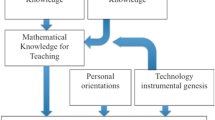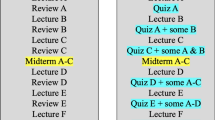Abstract
Little is known about the relationship between knowledge and instructional quality of novice primary school teachers during their first 3 years of teaching mathematics. This study utilizes the Classroom video analysis and the Mathematical quality of instruction to examine changes in beginning teachers’ usable knowledge and instructional quality, respectively, and their relationship in each year. The analyses reveal positive associations between knowledge and instructional quality in the second and third year of teaching. Two case study teachers illustrate the tight link between knowledge and practice and how different school contexts provide contrasting opportunities to learn from practice, thus contributing to the different patterns of knowledge and instructional quality over time. The findings suggest that usable knowledge of student mathematical thinking at the beginning of the profession supports teacher improvement in both knowledge and practice over time if the vision of the school context is aligned with student-centered instruction.


Similar content being viewed by others
References
Ball, D. L., Thames, M. H., & Phelps, G. (2008). Content knowledge for teaching: What makes it special? Journal of Teacher Education,59(5), 389–407.
Baumert, J., Kunter, M., Blum, W., Brunner, M., Voss, T., Jordan, A., et al. (2010). Teachers’ mathematical knowledge, cognitive activation in the classroom, and student progress. American Educational Research Journal,47(1), 133–180.
Blömeke, S., König, J., Busse, A., Suhl, U., Benthien, J., Döhrmann, M., et al. (2014). Von der Lehrerausbildung in den Beruf—Fachbezogenes Wissen als Voraussetzung für Wahrnehmung, Interpretation und Handeln im Unterricht. Zeitschrift für Erziehungswissenschaft,17(3), 509–542.
Boston, M. D., & Wolf, M. K. (2006). Assessing academic rigor in mathematics instruction: The development of Instructional Quality Assessment Toolkit (CSE Tech. Rep. No. 672). Los Angeles: University of California, National Center for Research on Evaluation, Standards, and Student Testing (CRESST).
Carpenter, T. P., Fennema, E., Peterson, P. L., Chiang, C. P., & Loef, M. (1989). Using knowledge of children’s mathematics thinking in classroom teaching: An experimental study. American Educational Research Journal,26(4), 499–531.
Charalambous, C. Y., & Litke, E. (2018). Studying instructional quality by using a content-specific lens: The case of the Mathematical Quality of Instruction framework. ZDM Mathematics Education,50, 445–460.
Charalambous, C. Y., & Praetorius, A. K. (2018). Studying mathematics instruction through different lenses: Setting the ground for understanding instructional quality more comprehensively. ZDM Mathematics Education,50, 355–366.
Copur-Gencturk, Y. (2015). The effects of changes in mathematical knowledge on teaching: A longitudinal study of teachers' knowledge and instruction. Journal for Research in Mathematics Education,46(3), 280–330.
Creswell, J. W., & Clark, V. L. P. (2017). Designing and conducting mixed methods research. Thousand Oaks: Sage publications.
Desimone, L. M., Hochberg, E. D., & McMaken, J. (2016). Teacher knowledge and instructional quality of beginning teachers: Growth and linkages. Teachers College Record,118, 1–54.
Downer, J. T., Booren, L. M., Lima, O. K., Luckner, A. E., & Pianta, R. C. (2010). The Individualized Classroom Assessment Scoring System (inCLASS): Preliminary reliability and validity of a system for observing preschoolers’ competence in classroom interactions. Early Childhood Research Quarterly,25(1), 1–16.
Empson, S. B., & Jacobs, V. R. (2008). Learning to listen to children’s mathematics. In D. Tirosh & T. Wood (Eds.), Tools and processes in mathematics teacher education (pp. 257–281). Rotterdam: Sense Publishers.
Fennema, E., & Franke, M. L. (1992). Teachers' knowledge and its impact. In D. A. Grouws (Ed.), Handbook of research on mathematics teaching and learning (pp. 147–164). New York: Macmillan.
Fennema, E., Carpenter, T. P., Franke, M. L., Levi, L., Jacobs, V., & Empson, S. (1996). A longitudinal study of learning to use children’s thinking in mathematics instruction. Journal for Research in Mathematics Education,27(4), 403–434.
Graham, M., Milanowski, A., & Miller, J. (2012). Measuring and promoting inter-rater agreement of teacher and principal performance ratings. Washington, DC: Center for Educator Compensation Reform. https://files.eric.ed.gov/fulltext/ED532068.pdf. Accessed 18 Aug 2018.
Hiebert, J., Morris, A. K., Berk, D., & Jansen, A. (2007). Preparing teachers to learn from teaching. Journal of Teacher Education,58(1), 47–61.
Hill, H. C., Rowan, B., & Ball, D. L. (2005). Effects of teachers’ mathematical knowledge for teaching on student achievement. American Educational Research Journal,42(2), 371–406.
Hill, H. C., Sleep, L., Lewis, J. M., & Ball, D. L. (2007). Assessing teachers’ mathematical knowledge: What knowledge matters and what evidence counts. In F. K. Lester (Ed.), Second handbook of research on mathematics teaching and learning (pp. 111–156). Charlotte: Information Age Publishing.
Hill, H. C., Blunk, M. L., Charalambous, C. Y., Lewis, J. M., Phelps, G. C., Sleep, L., et al. (2008). Mathematical knowledge for teaching and the mathematical quality of instruction: An exploratory study. Cognition and Instruction,26(4), 430–511.
Hill, H. C., Charalambous, C. Y., & Kraft, M. A. (2012). When rater reliability is not enough: Teacher observation systems and a case for the generalizability study. Educational Researcher,41(2), 56–64.
Ho, A. D., & Kane, T. J. (2013). The reliability of classroom observations by school personnel. Research paper. MET Project. Seattle: Bill and Melinda Gates Foundation.
Hoth, J., Döhrmann, M., Kaiser, G., Busse, A., König, J., & Blömeke, S. (2016). Diagnostic competence of primary school mathematics teachers during classroom situations. ZDM Mathematics Education,48(1–2), 41–53.
Kaiser, G., Busse, A., Hoth, J., König, J., & Blömeke, S. (2015). About the complexities of video-based assessments: Theoretical and methodological approaches to overcoming shortcomings of research on teachers’ competence. International Journal of Science and Mathematics Education,13(2), 369–387.
Kaiser, G., Blömeke, S., Koenig, J., Busse, A., Doehrmann, M., & Hoth, J. (2017). Professional competencies of (prospective) mathematics teachers: Cognitive versus situated approaches. Educational Studies in Mathematics,94(2), 161–182.
Kersting, N. B., Givvin, K. B., Sotelo, F. L., & Stigler, J. W. (2010). Teachers’ analyses of classroom video predict student learning of mathematics: Further explorations of a novel measure of teacher knowledge. Journal of Teacher Education,61(1–2), 172–181.
Kersting, N. B., Givvin, K. B., Thompson, B. J., Santagata, R., & Stigler, J. W. (2012). Measuring usable knowledge: Teachers’ analyses of mathematics classroom videos predict teaching quality and student learning. American Educational Research Journal,49(3), 568–589.
König, J., Blömeke, S., Klein, P., Suhl, U., Busse, A., & Kaiser, G. (2014). Is teachers’ general pedagogical knowledge a premise for noticing and interpreting classroom situations? A video-based assessment approach. Teaching and Teacher Education,38, 76–88.
König, J., Blömeke, S., & Kaiser, G. (2015). Early career mathematics teachers’ general pedagogical knowledge and skills: Do teacher education, teaching experience, and working conditions make a difference? International Journal of Science and Mathematics Education,13(2), 331–350.
Kunter, M., Klusmann, U., Baumert, J., Richter, D., Voss, T., & Hachfeld, A. (2013). Professional competence of teachers: Effects on instructional quality and student development. Journal of Educational Psychology,105(3), 805–820.
National Governors Association. (2010). Common Core State Standards for Mathematical Practice. https://www.corestandards.org/Math/Practice/. Accessed 10 Sept 2018.
Peterson, P. L., Fennema, E., & Carpenter, T. (1989). Using knowledge of how students think about mathematics. Educational Leadership,46(4), 42–46.
Philipp, R. A., Ambrose, R., Lamb, L. L., Sowder, J., Schappelle, B. P., Sowder, L., et al. (2007). Effects of early field experiences on the mathematical content knowledge and beliefs of prospective elementary school teachers: An experimental study. Journal for Research in Mathematics Education,38, 438–476.
Putnam, R. & Borko, H. (1997). Teacher learning: Implications of new views of cognition. In B. J. Biddle, T. L. Good, & I. F. Goodson (Eds.), The international handbook of teachers and teaching (pp. 1223–1296). Dordrecht, The Netherlands: Kluwer.
Santagata, R., Yeh, C., & Mercado, J. (2018). Preparing elementary school teachers to learn from teaching: A comparison of two approaches to mathematics methods instruction. Journal of the Learning Sciences,27(3), 474–516.
Sawada, D., Piburn, M., Judson, E. M., Turley, J., Falconer, K., Benford, R., et al. (2000). Measuring reform practices in science and mathematics classrooms: The reformed teaching observation protocol. School Science and Mathematics Journal,102, 245–253.
Schlesinger, L., Jentsch, A., Kaiser, G., König, J., & Blömeke, S. (2018). Subject-specific characteristics of instructional quality in mathematics education. ZDM Mathematics Education,50(3), 475–490.
Schoenfeld, A. H., & Kilpatrick, J. (2008). Toward a theory of proficiency in teaching mathematics. International Handbook of Mathematics Teacher Education,2, 321–354.
Sherin, M. G. (2002). When teaching becomes learning. Cognition and Instruction,20(2), 119–150.
Shulman, L. S. (1986). Those who understand: Knowledge growth in teaching. Educational Researcher,15(2), 4–14.
Simon, M. A. (1997). Developing new models of mathematics teaching: An imperative for research on mathematics teacher development. In E. Fennema & B. S. Nelson (Eds.), Mathematics teachers in transition (pp. 55–86). Mahwah: Lawrence Erlbaum.
Simpson, A., Vondrová, N., & Žalská, J. (2018). Sources of shifts in pre-service teachers’ patterns of attention: The roles of teaching experience and of observational experience. Journal of Mathematics Teacher Education,21, 607–630.
Acknowledgements
This research was supported by the National Science Foundation (REESE program) under Grant DRL-0953038. Any opinions, findings, and conclusions expressed in this material are those of the authors and do not necessarily reflect the views of the funding agency. A previous version of this paper was presented at the 2018 annual meeting of the American Educational Research Association in New York, NY, USA. The authors thank the teachers for their participation and for opening their classroom doors and making their instruction public. They are also grateful to Janet Mercado and Cathery Yeh who assisted with data collection and organization; to Rosalind Alicia Ball who scored lesson videos for inter-rater reliability; and to several undergraduate research assistants who completed lesson transcriptions.
Author information
Authors and Affiliations
Corresponding author
Additional information
Publisher's Note
Springer Nature remains neutral with regard to jurisdictional claims in published maps and institutional affiliations.
Rights and permissions
About this article
Cite this article
Lee, J., Santagata, R. A longitudinal study of novice primary school teachers’ knowledge and quality of mathematics instruction. ZDM Mathematics Education 52, 295–309 (2020). https://doi.org/10.1007/s11858-019-01123-y
Accepted:
Published:
Issue Date:
DOI: https://doi.org/10.1007/s11858-019-01123-y




